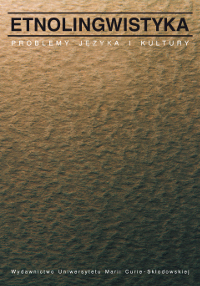Языковое самосознание староверов Латгалии
Linguistic self-identification of Old Believers in Latgalia
Author(s): Elena KorolevaSubject(s): Anthropology, Language studies, Language and Literature Studies, Applied Linguistics, Cognitive linguistics
Published by: Wydawnictwo Naukowe Uniwersytetu Marii Curie-Sklodowskiej
Keywords: linguistic awareness; axiological opposition; group identity; politeness formulae; emotives (exclamations); Old Believers; Latgale; Latvia
Summary/Abstract: The author describes the history of Old Believers in an eastern part of Latvia called Latgalia. The people appeared there in the 17th century, having escaped from persecutions on the part of tsarist administration (the land belonged to Poland at the time). The region was deserted because of a plague epidemic. Old Believers played an important role in the development of the region’s economy. The importance of religious life rose in the 1980’s but at the moment it is diminishing again due to the emigration of the younger generation to Western Europe. There are about 100,000 Old Believers in Latvia today, the biggest community in the Baltic region. The author supports the view that Old Believers are a sub-ethnic group within the Russian ethnos. All conditions necessary for recognizing them as an ethnic group are fulfilled: a common origin and history, the role of culture, tradition, language and territory, as well as the feeling of ethnic distinctness. The level of the latter is high, Old Believers are proud to belong to the unique community which they constitute. This is manifested in the use of the names in reference to themselves. The people reject the negative name raskol’niki (i.e. those responsible for divisions) or staroobryadtsy, the latter being imposed by their enemies. They usually use the terms starovery or starovertsy ‘Old Believers’, with a positive element in it, highlighting the ancient, traditional and orthodox nature of the religion. The names can also be used as ethnonyms. Other names, too, contain elements of positive self-valuation: krepkovery, krepkovertsy. In reference to the members of the Orthodox Church, in turn, they use the names nikonantsy or nikonane (those who accepted Nikon’s reform). Another term used for the purpose, with negative valuation, is tserkovniki. In this way the US/THEM opposition is superimposed on the axiological opposition RIGHT/WRONG. Another manifestation of one’s integration with the group are certain polite forms of address and interjections (emotives).
Journal: Etnolingwistyka. Problemy Języka I Kultury
- Issue Year: 20/2008
- Issue No: 20
- Page Range: 231-242
- Page Count: 12
- Language: Russian

